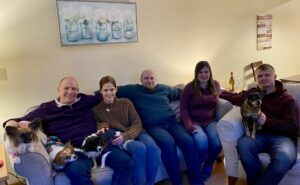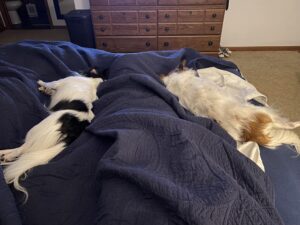I recently heard a young person (I know; it’s crazy when we stop fitting in this category) use the phrase “doing the most” to describe a person going over the top–and they didn’t mean it in a good way. It’s a little funny when you think about it, though–“doing the most” should really be a good thing. However, I think as EDS and HSD patients, we treat ourselves much the same way when it comes to self-advocacy with doctors and it probably starts with the fact that so many medical professionals treat us exactly the same way. Here’s what I mean–when we push for answers and help by, in a literal sense doing the most, we are seen as pushy hypochondriacs or people who have done a few too many Google searches, maybe people who have self-diagnosed, maybe people whose tests up to now look “normal” and therefore nothing is wrong except what’s in our heads, we judge ourselves just like those young people. We see ourselves with that same negative connotation. The self-degradation sets in like POTS in summer weather with no Gatorade.
Over time, this degradation contributes to medical trauma (medical trauma ultimately the responsibility of a system in which so much advocacy should not be necessary but that’s another topic for another day). It drives us to stop seeking answers and advocating. It pushes us to isolate and over time, we may even begin to believe we are crazy. I heard once the average time of diagnosis from onset of symptoms for an EDS patient was over 22 years (I can’t cite a source here and this has likely changed; don’t come for me). When you think about what 22 years looks like–if that period of time were a human being, they could graduate college. That is a college graduate worth of years feeling crazy and begging for answers from any number of medical professionals who make you feel even more like a crazy person. AND, that’s only on average. Imagine you are the outlier. You are the person who is in your 50’s at time of diagnosis having spend decades collecting traumatic experiences like I collect Taylor Swift merchandise. Trauma doesn’t just change the mind. Trauma changes the body. Society fails to see medical trauma as real trauma so often and we deserve better.
I suppose I have begun to ramble yet again and missed the point entirely, so I’m going to attempt to do something helpful rather than continue down a negative path. I was fortunate to be surrounded by people who made sure I didn’t stop pushing no matter how discouraged I got. They didn’t let me give up even when I was told for the 857th time if I lost weight I would feel better, even when that turned into an eating disorder and I still didn’t feel any better, even when another orthopedic doctor told me they couldn’t explain why surgeries either needed to be done or had failed. In this way, I learned quickly how to “do the most.” What that meant was when one doctor didn’t have an answer, they weren’t the right doctor–not that nothing was wrong. What that meant was when a doctor spoke to me in a way that had me sobbing in the car on the way home, we called and filed a complaint with the system, even if all that did was put some note in some file somewhere. What that meant was making a list before every appointment of what needed to be done and if it didn’t happen, we moved on. What that meant was making sure when I was ready to give up, nobody else around me was.
In reality, I’m not that good at this myself. I’m a “do as I say” person and I can advocate fiercely for all of you. (I’ll go to the doctor with you if you need.) I think how I have learned to “do the most” is by bringing my husband who has learned the means by which to get me the help I need. He won’t leave a doctor’s office until he asks every question. He keeps detailed records of all my medical bills, every visit, procedure, and prescription. He reminds me all the time that I am not a bother to these professionals AND that even if I am, it is their responsibility to accept that bother. He has helped me exercise when I have needed it and made sure I rest when I would otherwise push my body too far. He will run to get me electrolytes in a POTS episode, made sure I refill my medications, and picked them up whenever necessary. He helped me get my emotional support animal and manages the pet insurance for them as well.
Sometimes, the best way to advocate for ourselves is to accept there are times when we are simply too weary to do so. Sometimes, we do the most by recognizing others love us on our medical battlefields when that trauma causes us to freeze up. All the best intentions and the most lists won’t help when we get flashbacks on every exam table. Wars are not won by a single soldier. You don’t need to win by yourself either and we are all here to back you up.
I have also made progress in my ability to do the most by recognizing my need for mental health assistance. Let me be clear–this is not because my pain or disease are imaginary. This is because living with my pain, disease, and other things in my life is simply too much to handle without that help. I will never forget the psychiatrist to whom I said I had heard my pain was in my head for so long I was convinced it was. He looked me in the eye and said, “of course it is; that’s where we feel pain.” It was this moment of profound insight. He took this sentence I said and changed its meaning in a single sentence. From that moment, whenever I feel my pain is in my head because of a flashback, I giggle a bit and tell myself “of course it is.” I go to therapy every week and I love my therapist. When I saw one I didn’t love, I moved on. My therapist has researched EDS and has another patient with it as well. This has given her immense insight and not only makes her better with me but she says it makes her a better therapist all around. I agree. Don’t be afraid to ask for this professional help either.
I guess what I’m saying at the end of the day–no matter what any young person says, “doing the most” in this part of your life is not only helpful, it is necessary. You deserve the best treatment, the right diagnoses, and a community of people around you who understand and support you. I hope you will use this community to help you find professionals who make doing the most require less of your energy, less exhaustion, and less frustration–and I hope as you have read this, you know even more that you are not alone.

My Advocate



